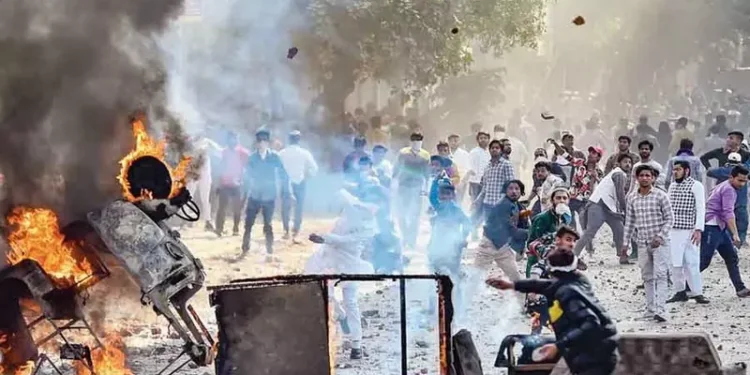A Delhi Court has sentenced nine men, Mohd Shahnawaz, Mohd Shoaib, Shahrukh, Rashid, Azad, Ashraf Ali, Parvez, Md Faisal and Rashid, to seven years of rigorous imprisonment in a case related to Delhi Riots 2020. The court convicted these nine men under various sections of the Indian Penal Code (IPC) on March 13.
The Delhi Court said, “They have been held guilty against the charges that during the night intervening between 24.02.2020 and 25.02.2020, at Chaman Park, Shiv Vihar, Tiraha Road, Delhi from 12 midnight onwards they all belonging to Muslim community along with their other associates (unidentified) formed an unlawful assembly, the object whereof was to cause maximum damage to the persons belonging to Hindu community as well as their properties and to create fear & insecurity in the minds of the members of Hindu community and this mob including aforesaid convicts committed vandalism, theft and mischief by fire in the House No. A-49A.” Furthermore, the court added, “They all had assembled in violation of prohibitory order passed by ld. DCP (N/E) under Section 144 Cr.P.C.”
The Delhi Court, while assessing the impact of the convict’s crimes, said that their acts have left a deep scar over the social fabric, economy and stability of India. The court said, “Thus, impact of the crime committed by the convicts in this case, is not limited to loss caused to the complainant only. Rather their acts left a deep scar over the social fabric, and economy and stability of our nation. The alleged acts instilled sense of insecurity among the people, while jeopardizing the communal harmony in the society.”
The Delhi Court held that while reformation is the most ideal aim, there must be some indication appearing from the convict’s conduct for the same and that the same cannot be demanded to escape the consequences of misdeeds. The court said, “though reformation is most ideal aim, but even for that purpose there must be some indication appearing from the conduct of the convict. It cannot be demanded just to escape the consequences of misdeeds. In the present case, sentence must be based on consideration balancing the impact of crime on the society and background of the convicts.”
Furthermore, the Delhi Court noted that according to the victim impact report, the complainant claimed a loss of Rs 35 lakhs, however, the same could not be substantiated through any documents. The court observed, “It is not easy task for a victim to substantiate the loss through documents in all the cases, especially if everything was burnt.” The court also noted that the Delhi Government paid Rs 2.5 lakhs as compensation to the complainant.
The Delhi Court said, “An amount of Rs.1.5 lacs shall be disbursed to the complainant/victim as compensation from the fine recovered under this Section,” while awarding seven years rigorous imprisonment to the convicts and imposing a Rs 20,000 fine each.
Background
On March 13, a Delhi Court convicted nine men, Mohd Shahnawaz, Mohd Shoaib, Shahrukh, Rashid, Azad, Ashraf Ali, Parvez, Md Faisal and Rashid, for committing offences punishable u/s 147, 148, 149, 188, 380, 427 & 436 of the IPC in case related to Delhi Riots 2020.
The complainant alleged that while she was at her house, she witnessed stone pelting in her gali and there was a mob at the gate attempting to break her house’s gate. She called her husband, who came home and took her to a safe place and locked the gate. She further alleged that the mob broke open her house’s rear gate on the intervening night of February 24 and 25, 2020, and robbed the goods. The mob also damaged her house and set the upper floor’s room on fire. The Delhi Police registered her complaint in FIR No. 53/2020.
The Delhi Court convicted all nine accused of offences punishable u/s 147, 148, 149, 188, 380, 427 & 436 of the IPC. While three accused were lodged in jail, six accused were out on bail. The court directed for all nine accused to be taken into judicial custody. Earlier, the court acquitted all nine accused in connection to FIR No. 40/2020, Gokalpuri Police Station and four accused in connection to FIR No. 83/2020. The two FIRs were similar to the present case i.e. FIR No. 53/2020.



















Comments